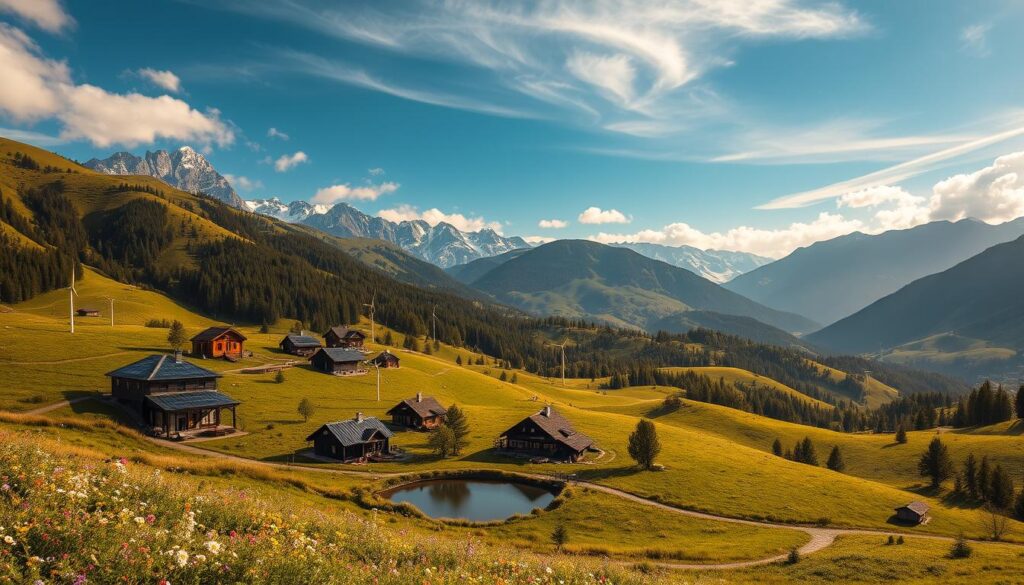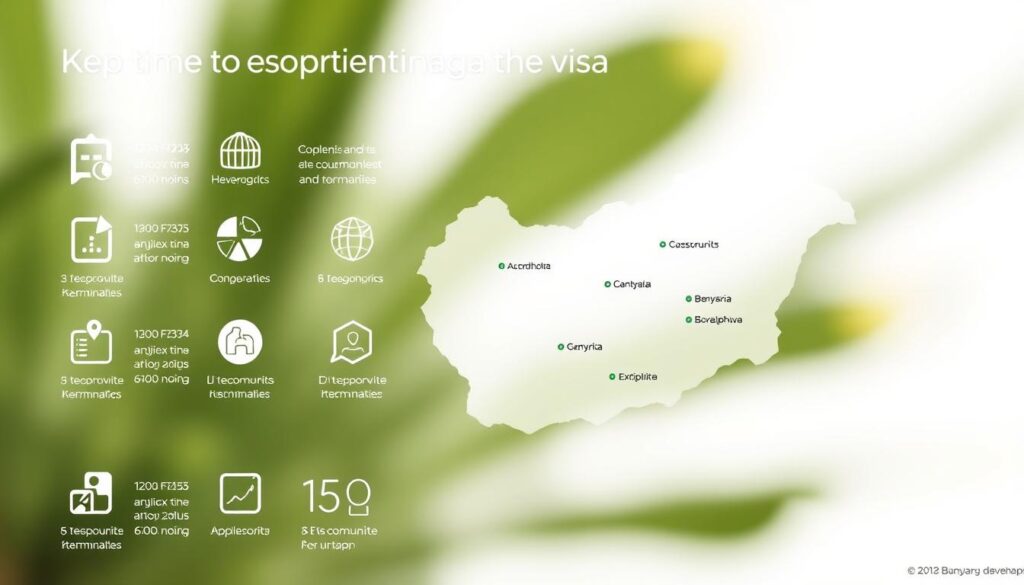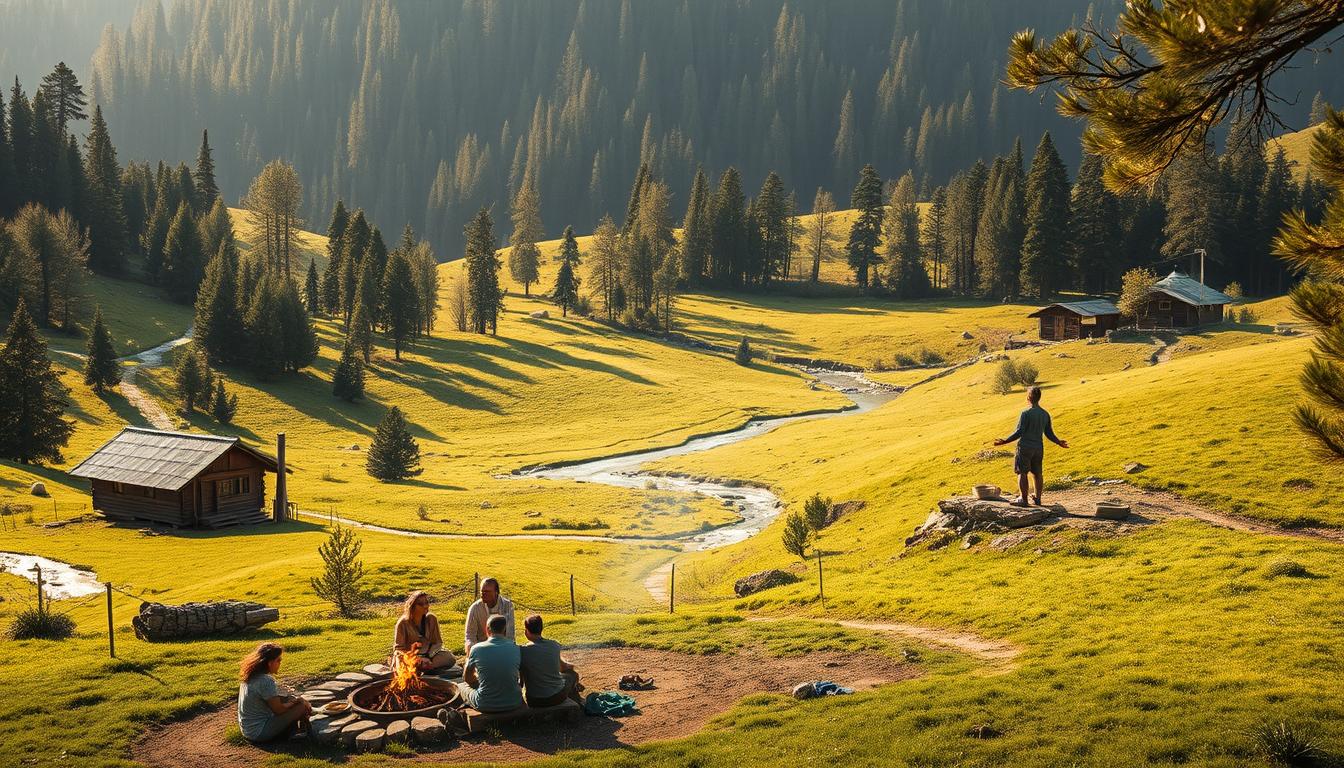Did you know that over 40 countries have been explored by remote workers in just the past few years? This global shift has sparked a new trend: combining digital nomad life with sustainable, off-grid living. Bulgaria is at the forefront of this movement, offering unique eco-communities tailored to modern remote workers.
These communities blend innovative design with eco-friendly principles, creating spaces where work and nature coexist. From energy-efficient buildings to shared coworking spaces, they provide everything a digital nomad needs to thrive. The focus is on fostering a strong sense of community while minimizing environmental impact.
Living in these spaces means access to affordable housing, fresh organic food, and a supportive network of like-minded individuals. Whether you’re a long-term resident or a short-term visitor, Bulgaria’s eco-communities offer a model for sustainable, fulfilling living. Ready to explore this unique lifestyle? Let’s dive in.
Contents
- 1 Exploring Bulgaria’s Eco-Villages & Sustainability: A Digital Nomad Perspective
- 2 Navigating Off-Grid Living and Remote Work Essentials
- 3 Understanding Visa Requirements, Cost of Living, and Accommodation Options
- 4 Uncovering Networking Opportunities and Digital Nomad Communities
- 5 Building a Sustainable Lifestyle Amid Off-Grid Living in Europe
- 6 Looking Ahead: Inspiring Paths for Your Eco Nomad Journey
Exploring Bulgaria’s Eco-Villages & Sustainability: A Digital Nomad Perspective
Imagine working remotely while surrounded by nature in Bulgaria’s innovative eco-villages. These communities are designed to support a digital nomad lifestyle while minimizing environmental impact. From renewable energy systems to organic food practices, they offer a unique blend of modern convenience and traditional living.

Bulgaria’s eco-villages are powered by sustainable frameworks that prioritize renewable energy. Solar panels and wind turbines are common, ensuring a low carbon footprint. This approach not only reduces costs but also aligns with global efforts to combat climate change.
Food is another cornerstone of these communities. Many eco-villages grow their own produce using organic farming techniques. This ensures fresh, healthy meals while supporting local development. Community meals are a daily highlight, fostering connections among residents and visitors alike.
Global examples like New York’s urban farming initiatives and Germany’s renewable energy projects show how sustainable practices can thrive. Bulgaria’s eco-villages draw inspiration from these models, creating a world-class experience for digital nomads.
Finding reliable coworking spaces is easy in these communities. Many eco-villages offer shared workspaces with high-speed internet, perfect for remote work. Community-led events, such as workshops and retreats, provide opportunities for networking and skill-building.
The balance between modern technology and traditional living is a key feature. Residents enjoy the benefits of high-speed internet while staying connected to nature. This process-driven development ensures a harmonious lifestyle for all members.
| Feature | Details |
|---|---|
| Renewable Energy | Solar panels, wind turbines |
| Food Practices | Organic farming, community meals |
| Coworking Spaces | High-speed internet, shared desks |
| Community Events | Workshops, retreats, networking |
These eco-villages are more than just a place to live and work. They are a testament to the positive impact of sustainable living. By joining these communities, digital nomads can contribute to a greener world while enjoying a fulfilling lifestyle.
Combining remote work with off-grid living is easier than you might think. With the right tools and mindset, digital nomads can thrive in eco-friendly communities while staying productive. Here’s how to make the transition seamless.
First, ensure reliable internet connectivity. Many off-grid communities use satellite or high-speed broadband to support remote work. Investing in a portable Wi-Fi hotspot can also be a game-changer for staying connected.

Next, explore coworking spaces within these communities. Shared workspaces often come equipped with desks, high-speed internet, and a collaborative atmosphere. These spaces are perfect for networking and staying focused.
Digital tools are essential for remote work. Apps like Trello for task management, Zoom for meetings, and Slack for team communication can streamline your workflow. These tools help maintain productivity, even in an off-grid setting.
Community practices play a significant role in off-grid living. Many eco-friendly communities offer educational programs focused on permaculture, renewable energy, and organic farming. These programs not only enhance your skills but also foster a sense of belonging.
- Internet Connectivity: Use satellite or portable Wi-Fi for reliable access.
- Coworking Spaces: Shared workspaces with high-speed internet.
- Digital Tools: Apps like Trello, Zoom, and Slack for productivity.
- Community Programs: Workshops on permaculture and renewable energy.
Lifestyle choices are key to balancing work and sustainable living. Embrace practices like rainwater harvesting, solar energy, and organic gardening. These not only reduce your environmental impact but also enhance your well-being.
Joining an established eco-friendly community abroad can be a rewarding experience. Shared meals, collaborative projects, and cultural exchanges enrich your life while supporting a sustainable way of living.
By adopting off-grid practices, you can improve both personal well-being and professional performance. The blend of modern technology and traditional living creates a harmonious lifestyle for digital nomads.
Understanding Visa Requirements, Cost of Living, and Accommodation Options
Bulgaria’s eco-communities are redefining what it means to live and work sustainably. For digital nomads, understanding the logistics is key to making the transition seamless. Let’s break down the essentials.
First, visa requirements are straightforward. Bulgaria offers long-term visas for remote workers, including digital nomad visas. These allow you to stay legally while enjoying the benefits of eco-friendly living. Processing times vary, but preparation is key.

The cost of living in Bulgaria is affordable, especially compared to the United States. Accommodation, food, and utilities are budget-friendly. For example, renting a co-housing space can cost as little as $300 per month. Fresh produce from local farming initiatives is both healthy and economical.
Accommodation options are diverse. From eco-friendly apartments to community-owned residences, there’s something for everyone. Many buildings are designed with energy-efficient systems, reducing costs and your ecological footprint.
Renewable energy is a cornerstone of these communities. Solar panels and wind turbines are common, ensuring a sustainable lifestyle. This concept not only lowers utility bills but also aligns with global movements toward green living.
Permaculture plays a significant role. Local agriculture and farming practices ensure fresh, organic food. This approach supports the land while fostering a sense of community. Shared meals are a highlight, bringing members together.
Managing finances and legal documentation is easier with resources from the ecovillage network. These platforms offer guidance on budgeting, taxes, and local integration. Networking opportunities within these neighborhoods are invaluable for newcomers.
By choosing Bulgaria’s eco-communities, you’re not just finding a place to live. You’re joining a global movement that values sustainability, community, and innovation. Ready to take the leap? The land of opportunity awaits.
Uncovering Networking Opportunities and Digital Nomad Communities
Building connections can transform your experience in eco-friendly spaces. For digital nomads, networking is more than just meeting people—it’s about finding a supportive community that shares your values. Whether you’re in Bulgaria or exploring other parts of the world, these connections can enhance both your personal and professional life.
One of the best ways to start is by joining established digital nomad communities. Platforms like Facebook and Meetup host groups focused on eco-friendly living and remote work. These groups often organize events, workshops, and retreats, providing opportunities to meet like-minded individuals.
Local and international events are another great way to network. For example, the ecovillage network hosts annual gatherings where residents and visitors share ideas on sustainable living. These events often include workshops on permaculture, renewable energy, and collaborative business models.
Digital tools also play a crucial role in fostering connections. Apps like Hylo and Slack are designed to bring people together around shared interests. These platforms make it easy to find local meetups, share resources, and collaborate on projects.
Here’s a quick overview of key networking platforms and events:
| Platform/Event | Details |
|---|---|
| Facebook Groups | Search for “Intentional Community” or “Ecovillage” to find relevant groups. |
| Meetup | Join location-based groups for eco-friendly living and remote work. |
| Hylo | A community-led platform for connecting with like-minded individuals. |
| Ecovillage Gatherings | Annual events focused on sustainable living and networking. |
Joining these communities can lead to collaborative opportunities. Many members have started successful projects together, from organic food initiatives to renewable energy startups. These collaborations not only benefit the community but also contribute to global sustainability efforts.
To make the most of these opportunities, focus on building meaningful relationships. Attend events regularly, participate in discussions, and offer your skills to the community. This approach not only enhances your career but also enriches your personal life.
By actively engaging in these networks, you’ll find a home that supports your values and goals. The impact of these connections extends far beyond individual success—it’s about creating a better world for everyone.
Building a Sustainable Lifestyle Amid Off-Grid Living in Europe
Building a sustainable lifestyle in Europe’s off-grid communities is both achievable and rewarding. These spaces combine modern technology with eco-conscious practices, creating a harmonious way of life. From renewable energy systems to community-led education programs, there’s a lot to explore.
One key strategy is adopting renewable energy. Many ecovillages use solar panels and wind turbines to power their homes. For example, Sieben Linden generates 65% of its electricity from photovoltaic panels. This approach reduces costs and supports a greener world.
Water conservation is another essential practice. Rainwater harvesting and efficient irrigation systems are common in these communities. For instance, Muttersholtz has reduced its energy consumption by 40% through sustainable water and energy practices. These methods ensure resources are used wisely.
Community-led programs play a vital role in fostering sustainable living. Workshops on permaculture and responsible building practices are regularly offered. These programs not only educate but also strengthen the bond among residents and visitors.
Here are some practical tips for reducing your ecological footprint:
- Use renewable energy sources like solar panels or wind turbines.
- Implement water-saving techniques such as rainwater harvesting.
- Participate in community programs to learn sustainable practices.
- Adopt a plant-based diet to reduce your environmental impact.
Digital tools and the global ecovillage network can also enhance your journey. Platforms like Hylo connect like-minded individuals, making it easy to share resources and collaborate on projects. These networks provide valuable support and inspiration.
By embracing these practices, you can create a balanced, resilient lifestyle. Off-grid living in Europe offers a unique opportunity to thrive while contributing to a sustainable future. Ready to take the first step? The world of eco-conscious living awaits.
Looking Ahead: Inspiring Paths for Your Eco Nomad Journey
The journey to eco-conscious living starts with a single step. By embracing off-grid living, you can transform your life while contributing to a greener world. From renewable energy systems to shared community spaces, the possibilities are endless.
Take inspiration from the global ecovillage network, which has connected thousands of residents and visitors for over 30 years. These neighborhoods showcase the power of collaboration and sustainable design. Whether you’re a long-term member or a short-term visitor, you’ll find a home that aligns with your values.
Start by exploring resources like workshops and digital tools. These platforms offer guidance on everything from water conservation to renewable energy. By joining a supportive community, you’ll gain the skills and connections needed to thrive.
Imagine a future where eco-friendly practices and remote work coexist harmoniously. The first step is yours to take. Begin your eco nomad journey today and be part of a movement that values innovation, connection, and the planet.


